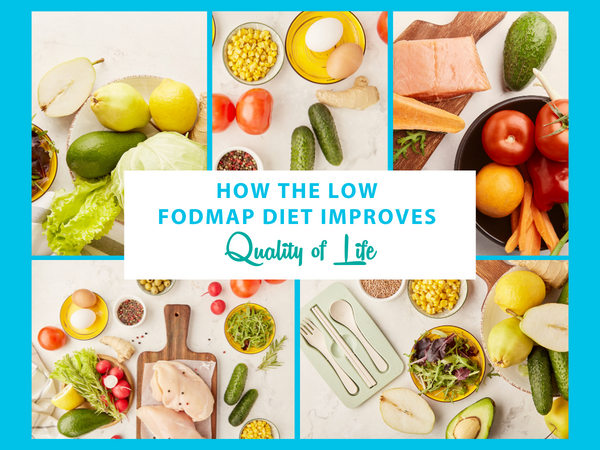- Ph: +61 435 003 412
- operations@fodshopper.com.au
"Organic Orange" has been added to your cart. View cart
"Organic Orange" has been added to your cart. View cart

Irritable bowel syndrome (IBS) is a functional gut disorder that affects up to 15% of the Western population. (1) It is common for individuals with IBS to experience symptoms such as bloating, constipation, diarrhoea, flatulence, and abdominal cramping. This may lead to a minimum of five annual visits to a general practitioner. (1)
Most commonly, a low FODMAP diet is prescribed to individuals with IBS to best relieve their symptoms, and has been known to relieve up to 86% of patient symptoms. (2) However, the diet isn't only appropriate for individuals with IBS.
Let's dive in to the low FODMAP diet's benefits and how it can improve quality of life.
For individuals with IBS, the low FODMAP diet is the most likely prescribed diet to improve gastrointestinal discomfort. The diet is now internationally recognised as the best management of IBS symptoms. (1)
A prospective observational study determined significant long-term improvements in quality of life, gastrointestinal symptoms, fatigue, and anxiety/depression in patients with IBS who followed a low FODMAP diet for 6 months. (3) This study highlights the importance of a low FODMAP diet for these patients as being beneficial on a variety of levels.
IBD encompasses two conditions: Ulcerative Colitis and Crohn's Disease. For individuals with IBD, the symptoms can be very similar to symptoms of IBS. The major difference is how individuals with IBD have an inflamed gut that becomes damaged, whereas there is no damage to the gut in IBS. Symptoms to watch out for include unexplained weight loss, blood in stools, and loss of appetite.
There is no cure for IBD however, treating it can prevent flare ups and help to manage symptoms. IBD patients are three times more likely than the regular population to have IBS. Individuals who are on a low FODMAP diet may experience less gastrointestinal symptoms such as diarrhoea, bloating, constipation, and/or abdominal cramping.
Coeliac Disease (CD) is an autoimmune disease where eating gluten can cause an immune response and damage to the intestine. Gluten is a protein that can be found in rye, wheat, and barley, and should be strictly avoided in individuals with CD. (4)
CD patients can also experience similar symptoms to IBS patients however, some red flags for CD include migraines, weight loss, failure to thrive, malnutrition, micronutrient deficiencies, and family history.
Despite adherence to a life-long gluten free diet, some CD patients may continue to experience bloating, diarrhoea, constipation, and stomach pains. For management of IBS-like gastrointestinal symptoms, a low FODMAP diet may also benefit CD patients to improve quality of life.
The low FODMAP diet has been internationally recognised as the best treatment and management for IBS, as it has shown to improve quality of life by increasing happiness and mood, and decreasing levels of fatigue, anxiety, depression, and gastrointestinal upset. (3)
It is important to ensure you have a proper diagnosis before attempting a low FODMAP diet. There are a few conditions that have overlapping symptoms that can be mistaken for IBS however, have red flags that should be addressed with your health professional. If you are unsure, contact your Accredited Practising Dietitian or general practitioner for advice on how to best manage your symptoms and if a low FODMAP diet is appropriate for you.
1. Barrett JS. How to institute the low-FODMAP diet: How to institute the low-FODMAP diet. J Gastroenterol Hepatol [Internet]. 2017 [cited 2022 Mar 17];32 Suppl 1:8–10. Available from: https://pubmed.ncbi.nlm.nih.gov/28244669/
2. Nanayakkara WS, Skidmore PM, O'Brien L, Wilkinson TJ, & Gearry RB (2016). Efficacy of the low FODMAP diet for treating irritable bowel syndrome: the evidence to date. Clinical and experimental gastroenterology, 9, 131–142. Available from: https://doi.org/10.2147/CEG.S86798
3. Kortlever, T. L., Ten Bokkel Huinink, S., Offereins, M., Hebblethwaite, C., O'Brien, L., Leeper, J., Mulder, C. J. J., Barrett, J. S., & Gearry, R. B. (2019). Low-FODMAP Diet Is Associated With Improved Quality of Life in IBS Patients-A Prospective Observational Study. Nutrition in clinical practice : official publication of the American Society for Parenteral and Enteral Nutrition, 34(4), 623–630. https://doi.org/10.1002/ncp.10233
4. NIDDK. Definition & Facts of Celiac Disease. https://celiac.org/about-celiac-disease/what-is-celiac-disease/. Accessed July 20,2023

Leave a reply